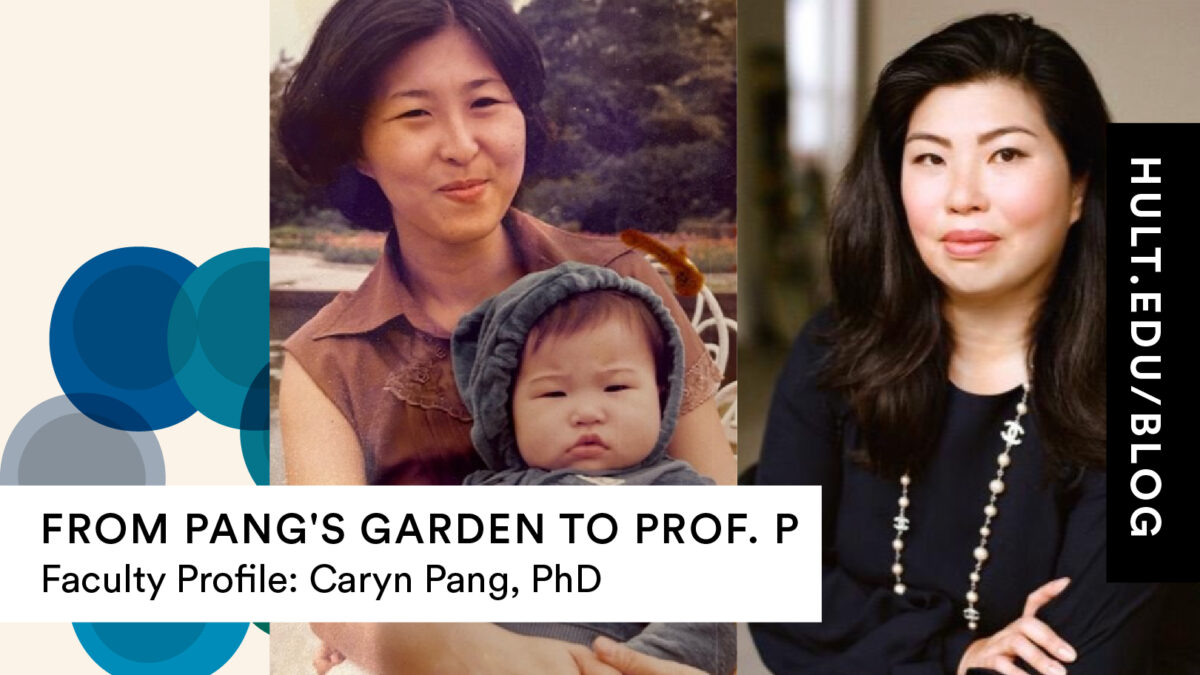Dr. Caryn Pang, affectionately known as “Prof. P” to her students, is a marketing professor based in Hult Boston. This World Mental Health Day, we caught up with Caryn to find out more about her personal journey, her approach to teaching, and how her collaboration with the Kyan Foundation led to the co-creation of a Wellness Hub in Hult Boston …
Chapter 1: Pang’s Garden
I grew up in a Chinese restaurant. I spent my early years between the Philippines and Taiwan, and I came to the States—Pittsburgh, Pennsylvania—when I was a little girl. That Chinese restaurant, the first one that my parents opened in the US, was the most magical place. It was called Pang’s Garden and I remember it so fondly because it really set me up to be who I am today.
How? It was seeing my parents, as entrepreneurs, start from nothing and create something we could all be proud of. From Pang’s Garden, they opened more restaurants and my parents really pioneered what is considered more elevated Chinese cuisine in that area. They brought regional Taiwanese cuisine and a different flair to what the US crowd was used to.
It was a dream that started with my mother—she really taught me to dream. She also taught me my value, my worth, and the importance of relationships. That’s what those formative years really taught me—how to build relationships.
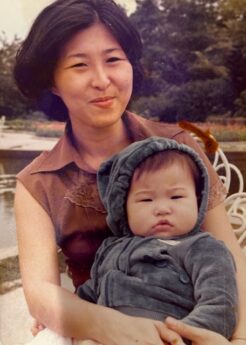

Chapter 2: Coco
From Pang’s Garden in Pittsburgh, I went to Boston for my undergrad and my MBA before heading to New York to study at the Fashion Institute of Technology. I’m a very proud alumna of their Global Fashion Management program, and I have my husband to thank for that. I was pregnant with my daughter when the program started but it was such an incredible opportunity, and he was the one who said to me: “You have to do this program.”
We traveled all over the world—Hong Kong, Paris—I presented to the CEO of Christian Dior and visited Coco Chanel’s apartment. I idolized Coco, she was an incredible businesswoman who transformed the way women dressed, was a formidable entrepreneur, and an incredible role model for every designer that came after her. I remember sitting on the same steps she had sat on and holding my pregnant belly (in my heart I knew I was having a girl) and whispering: “Baby girl, we’ve arrived.”
Chapter 3: Denim is Evil
I was a retail executive for many years. And that’s shaped me as a businesswoman and as a professor; so that when I go into the classroom, I’m able to give students thoughts on how to apply strategies in the business world. And it is not necessarily strategies that are just for the fashion industry. A lot of my strategies come from being an effective communicator. Then there is the whole process of self-leadership. I tell students: “You want to get to the C suite; you want to make millions of dollars and have all these millions of followers on social—you must lead self. You lead self, then you can lead others.”
The first class I taught at Hult back in 2020 was Marketing & Society, as part of the MIM program. I wanted it to really be about practical things that we can change; things that are happening now in society, and that students can connect to themselves. So, the challenge project in that first class was about denim. Everybody loves jeans, don’t they? But, from a sustainability point of view, denim is evil. The students were challenged to create a long-term sustainable marketing initiative that could combat the negative impact of denim—something they all wear almost every day.
I always ask myself: what is going to make students really think and make an impact?
I always ask myself: what is going to make students really think and make an impact? You want to be able to take ideas and make them applicable; help them to discover practical solutions. That’s a huge part of what we teach at Hult—we’re made to do. And so, I always say: “You have to be able to do. Don’t give me something that you can’t put in your portfolio. Give me something so that if I’m interviewing you, you can say: “This is what I did, and this is something different, and this is applicable to the job I’m applying for”.”
Every class that I teach, I bring in a corporate partner. Because that’s part of the experience, I think, and part of what I want to do as an educator. I want to engage you, I want to educate you, and I want to empower you.
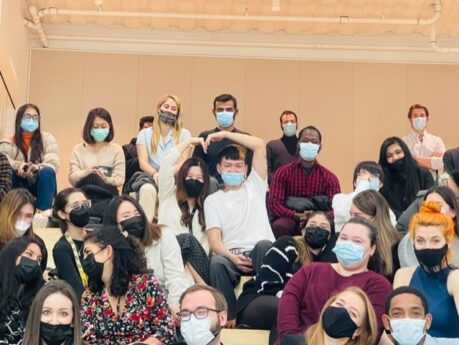

Chapter 4: Please Take Care of Yourself
Fast-forward a year to fall 2021 and we’d been through hell and back with covid. Uptick, downtick, masks, no masks, all these variants. There was this expectation that things were going to get better—and then they didn’t.
People were feeling so fatigued. Especially our students, who come from all over the world, and they’re away from home, they’re away from their families, they’re in this new place. I put my big sister hat on for a minute and said: “I know you just came back from the holidays; you’ve spent time with your family. And now you’re here, it’s dark and it’s cold. I need you to please take care of yourself—because the weather does impact your mood.”
This 2022 graduating class of Master’s in International Marketing in Boston is very special to me. It was the first class that I brought from beginning to end. I saw them on the first day. I saw them on the last day. I taught many classes with them and many of them took electives with me as well. During graduation, I was there. And so, I wanted to do something really special for them. I wanted them to be able to work with an organization that has an impact for good and that they would be able to also, through the process of a final project, understand what it means to practice mindfulness and wellbeing.
We created this space—a space for everybody—where people could say: “Wait a minute, time out.”
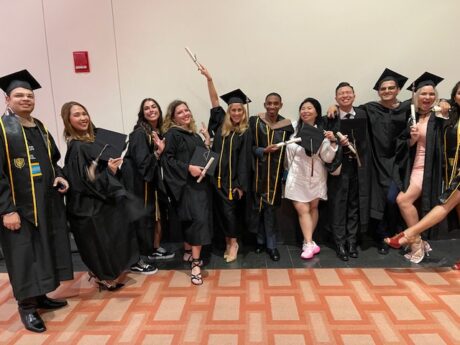

Chapter 5: Kyan and Sarah Asem
I got in touch with a foundation, Kyan Projects, which is a parenting and education non-profit that’s headed up by three sisters who are members of the Jordanian royal family. I worked closely with one of the sisters, Sarah Asem. The partnership Sarah and I have formed has been really tremendous. She has taught me so many different things. There’s this phrase that I heard Sheryl Sandberg use once that’s always stuck with me: Make your partner your partner. Don’t just say to somebody “I’ll be your partner”. Do it. Show them there’s action involved. Sarah and I form this great professional bond—we just work really well together.
The students in my Marketing & Society course worked in teams of six to rebrand Kyan. They had just come out of another class, an innovation class taught by Dr. Henrik Totterman. They built websites, they built apps—they really wanted to apply what they had learned in their last class to this one—it’s a continued journey. Sarah was really impressed with their ideas; a lot came out of the students’ proposals. One group had the idea of a Kyan bus, so they could travel around schools to help parents and children. That’s when Sarah said to me: “That’s my dream. I want to open Kyan wellness centers in schools.” And I said: “Why not start with Hult?”
Chapter 6: Kyan Comes to Hult
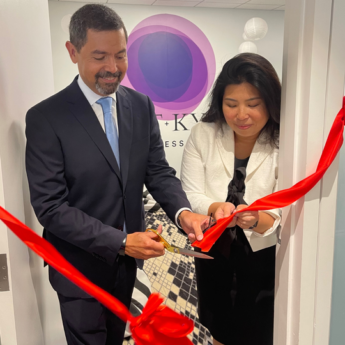

Long story short, it was a lot of Zoom calls with Sarah and working with a lot of different partnerships within Hult. I have to give a lot of credit to our Ops Director at Hult Boston, Colleen DeBeasi. If there’s anybody that can get it done, Colleen can get it done. And the former dean, Gonzalo Chavez, I don’t know if you can describe a dean as fabulous—but he is absolutely fabulous. He never once said to me “I don’t have time for that.” He was always there to listen to my thoughts and to my ideas. He understood that there’s a method to my madness and that, in the end, it is really for the good of the students.
Taking it full circle, the students’ idea is now a physical space. It’s come to fruition, and that is the legacy that they leave behind. This Wellness Hub, the first of its kind in higher education, it truly is a collaboration. The beauty of it was trusting each other, liking each other, and being able to have fun.
We need to be able to hone in on negative feelings, to learn how to process them.
Chapter 7: It’s a Lot
We are a top-ranked business school. This is not for the weak. It is fast-paced. It’s demanding. Many of the programs are only one year. You finish the core in nine months and then you’re taking the electives and then you graduate. For professors, on average every four to five weeks, you’ve got to wrap up a course, you’re starting a new one. It’s intense. It’s a lot in a year—for the students and for staff.
So we created this space—a space for everybody—where people could say: “Wait a minute, time out.” We now need to realize, because of what we went through with covid, that we need to take better care of ourselves. There needs to be a space that is dedicated to someone’s wellness, that’s not about work or study but is about them. So that they can go in and, for example, practice mindfulness. They can read books on wellness. They can meditate. And it doesn’t mean that they need to spend an hour there. They could just take 15 minutes to collect themselves in a neutral environment, and then step out and begin again.
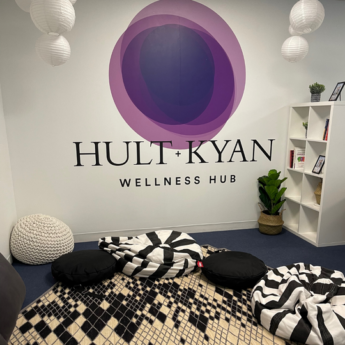

Chapter 8: Coping
Next, Sarah wants to work on curating specific mindfulness wellness programs. The first one is about coping skills and I think that’s something really important for students starting new programs in a new country. We need to be able to hone in on negative feelings, to learn how to process them. And that’s where Sarah comes in. It’s her profession but it’s also a lifelong journey for her. This is what she wants to do—she wants to help others.
We’re looking at bringing Hult-Kyan Wellness Hubs to more Hult campuses too. So watch this space …
Check out Dr. Pang in action teaching the Business of Fashion elective to students on rotation to Hult New York


